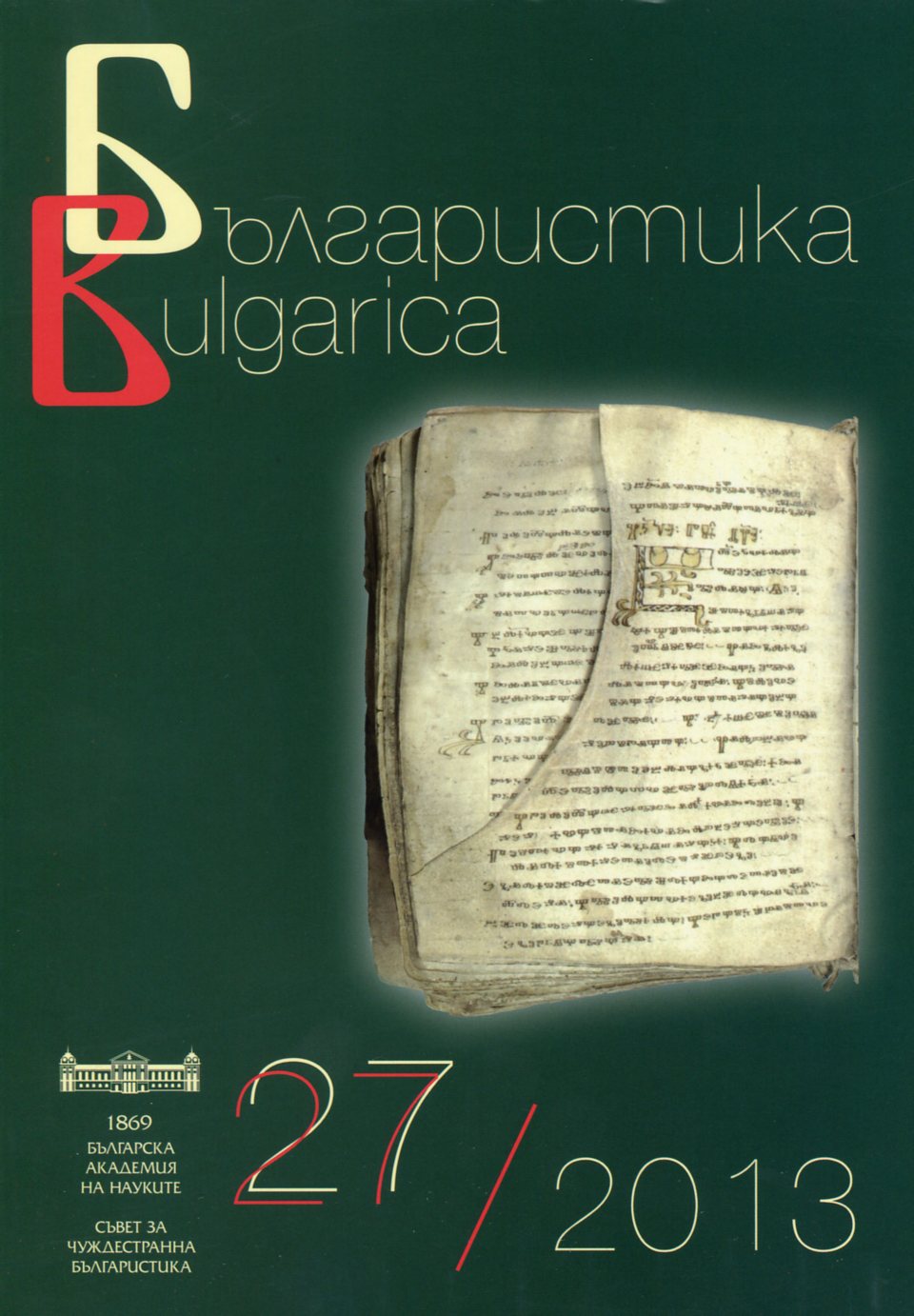
Дисертации
Defended PhD theses in Bulgaria in the field of linguistics, literature, history, folklore, ethnography and art studies
More...We kindly inform you that, as long as the subject affiliation of our 300.000+ articles is in progress, you might get unsufficient or no results on your third level or second level search. In this case, please broaden your search criteria.

Defended PhD theses in Bulgaria in the field of linguistics, literature, history, folklore, ethnography and art studies
More...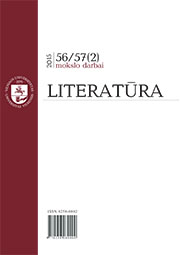
Более полувека назад замечательный историк русской литературы XVIII столетия П. Н. Берков пообещал опубликовать написанное Михаилом Матинским (1750–1820) и никогда не издававшееся либретто оперы Василия Пашкевича «Тунисской Паша»: «Текст ее <пьесы. – А.Л.> будет напечатан мною в одном из ближайших выпусков сборника „XVIII век“ »1. Обещание, однако, осталось не выполненным. Известный П. Н. Беркову и, похоже, единственный сохранившийся список этого драматического сочинения2 остался лежать в Театральной библиотеке в Санкт-Петербурге.
More...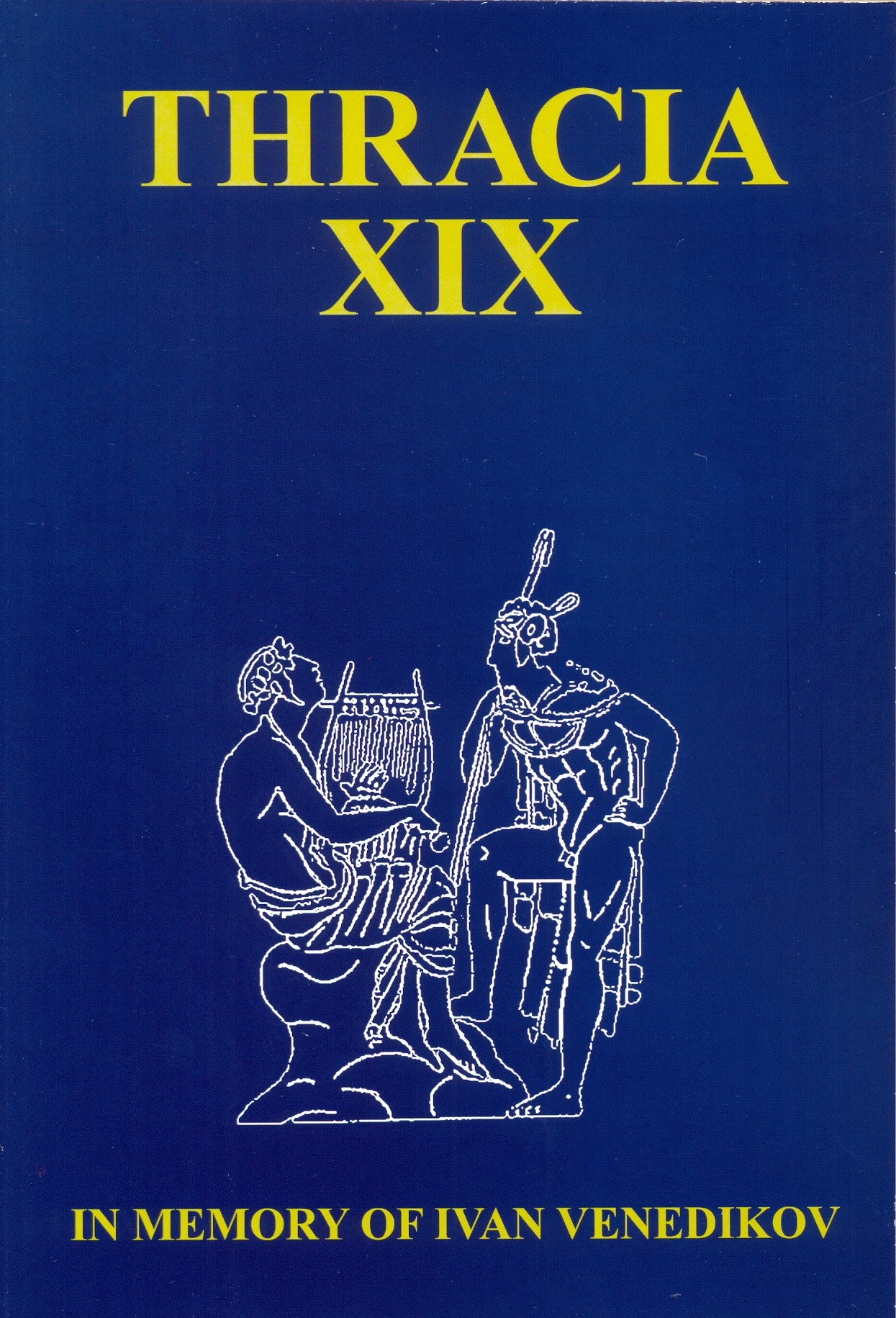
In the proposed paper the author has published for the first time two of the Greeks inscriptions found by him and Ivan Venedikov during archaeological excavations conducted by them between 1958 and 1970. The first inscription is the upper part of a marble slab and it contains an honorary decree concerning more than one – possibly two – citizens of the city of Neapolis (or Neopolis, accordingly). It is interesting to note the absence of reference to “the city council and the people” of Messambria. Some privileges are not expressed with their full text in the inscription, which complicated the reconstruction of the damaged or missing text. The author assumes that Neapolis from the decree was the same city as that on the Aegean Sea (in the present-day Kavala in Greece). The second decree was issued in honour of the ancestors of Dionysios, son of Omphalion, who held important posts in the city. His father occupied the priestly position of hieromnemon (hieromnamon in the Doric cities). That occupation appeared for the first time here in the colonies along the Western Black Sea coast. Both inscriptions should be dated to the 3rd century BC.
More...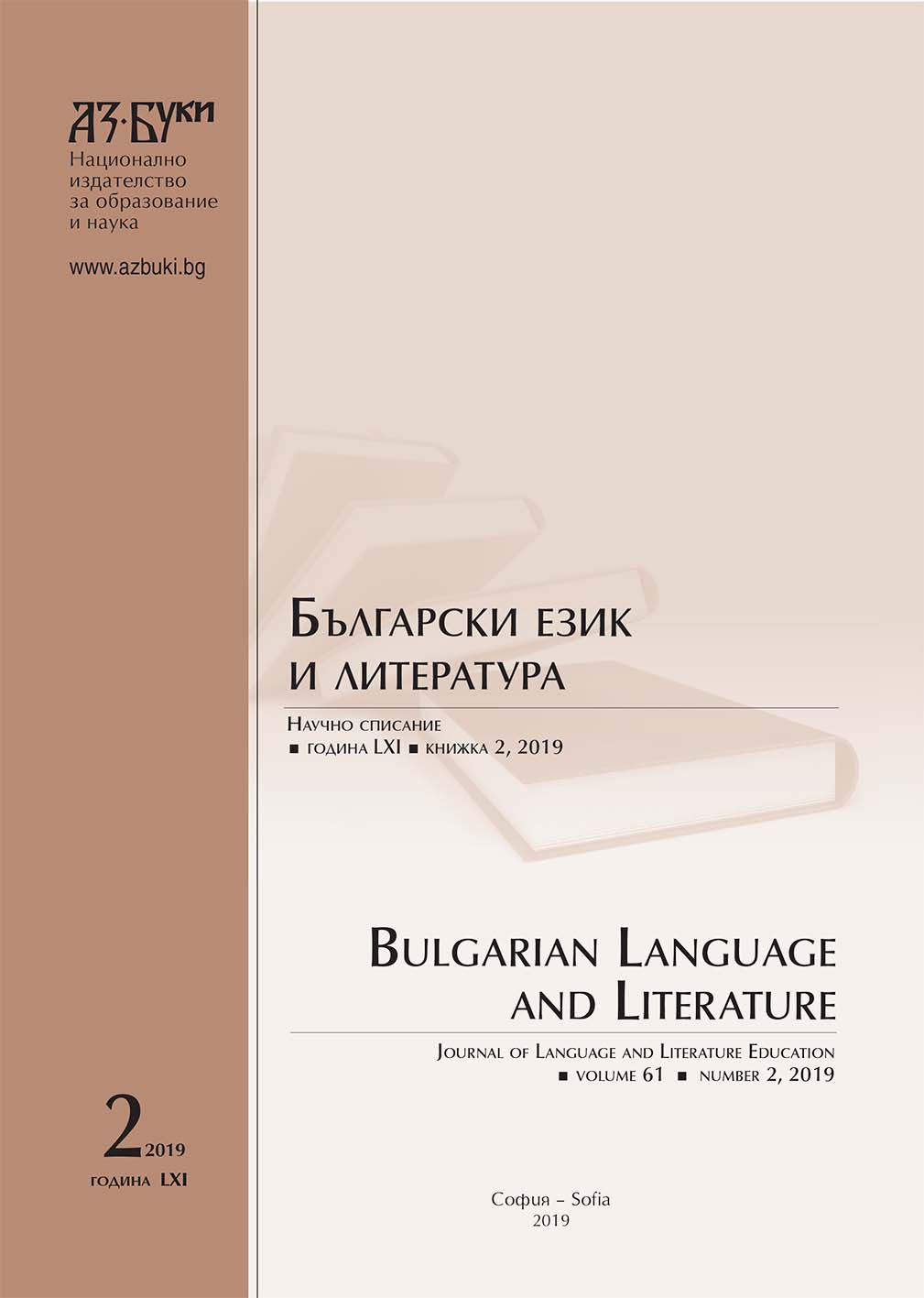
This report presents the activities of a small research community under the project of the School Institute of the Bulgarian Academy of Sciences (SchI-BAS), Small Research Communities programme. The project’s authors won first place from the humanities in SchI-BAS’s 2018 session. Their project (Presentday states of some Bulgarian dialects) presents dialect features in the villages of Tsalapitsa and Lyaskovo, district of Smolyan. In the course of the research process, the young researchers got to know their birth places, mother dialect features and the specifics of Dialectology. Thus their activity turned from a challenge into an opportunity to discover – through research – knowledge about mother dialects and skills related to processing language material.
More...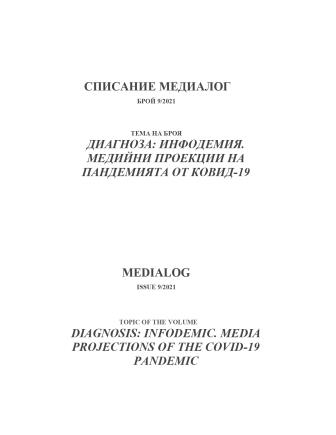
The text presents three media studies of students from the specialties "European Studies" and "Journalism" at Sofia University St. Kliment Ohridski", held at three time points from the battle of the world with Kovid-19. Each of the studies has its own purpose, methodological specifics and specific results, as well as its own name: Kovid in "Good News", Between "Second" and "Third Wave" and "For" and "Against" Vaccination. Collecting them together and in temporal sequence expands the information about the behavior of the media and, at the same time, outlines specific excitements and tendencies in different phases of the development of the disease until today.
More...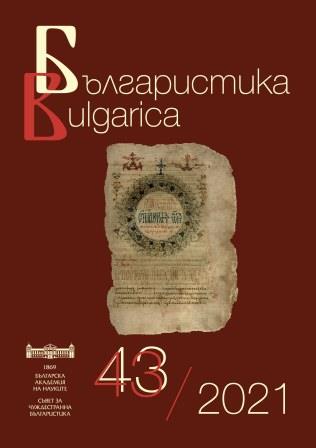
Defended Ph.D. theses in Bulgaria in the field of linguistics, literature, history, folklore, ethnography, and art studies
More...







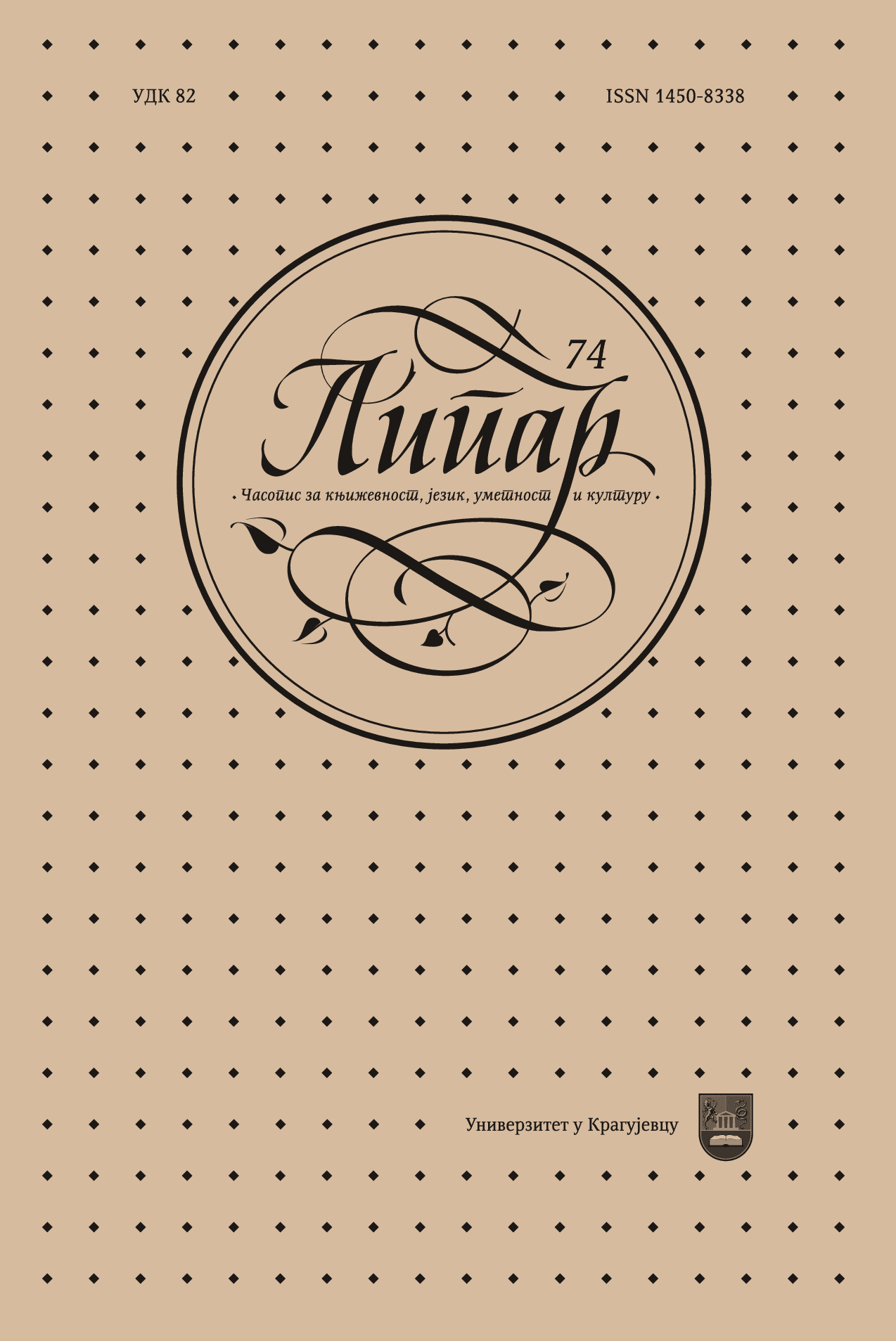
The paper deals with L2-L1 translation as used in different phases of an ES(A)P (English for specific academic purposes) course for different purposes – namely, as a complementary class activity carried out throughout the course, as well as one of the means of assessing students’ reading comprehension. It foregrounds the importance of selecting adequate materials, and elaborates on the different factors that this selection is dependent on. An extensive analysis of translations by students of the humanities and social sciences at the Faculty of Philosophy in Belgrade has been carried out, the results of which have been used to substantiate the rationale behind the use of translation as a learning and assessment tool, while indicating the kind of translation materials most appropriate for the two purposes. The paper also aims to contribute to the reevaluation of the use of translation in ESP, since it has for a long time been “ostracised” from language teaching practice, while placing this activity/tool in the context of the humanities and social sciences, which have also been undeservedly neglected in EFL/ESP studies.
More...
In this paper, the motif of wedding in the novel Nečista krv (Impure Blood), by Borisav Stanković is analysed from the viewpoint of erotological theory of George Bataille. The wedding is observed as a celebration resulting in psychoerotic release of the individual. The erotica manifested here has a key role in profiling two different cultures, the urban culture and the rural culture, personified in the Effendi Mita’s and Gazda Marko’s families. By comparing the urban and rural weddings, distinctive erotic features of the two cultures are perceived, as well as differences in character and aim of the celebration.
More...
This paper examines the last two literary works of George Orwell with the aim to analyze his political beliefs. Although these works have remained characterized primarily as critiques of totalitarianism and the Stalinist version of socialism, the pur- pose of this study is to show Orwell’s attitude towards the ideas of socialism in theory with parallel comparison of Animal Farm and Nineteen Eighty-Four. Furthermore, in order to consider this problem more comprehensively, it was necessary to research the author’s attitude towards capitalism and liberalism. The article is divided into two main sections. The first section gives a brief overview of Orwell’s political evolution from the second to the fourth decades of 20th century. The second section examines the content of the books which are the subject of research. The article proves that Orwell remained committed to the ideas of democratic socialism in both of his liter- ary works. Portrayal of Orwell as an anti-socialist is unjustified and was formed due to the Cold War context in the West. Additionally, the article concludes that Orwell’s Animal Farm and 1984 contain a critique of capitalism and Western imperialism, which is more pronounced in Animal Farm as compared to 1984.
More...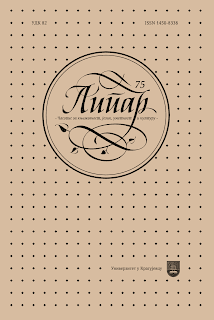
La place et le rôle de Paris et de Berlin en tant que capitales de deux pays importants de l’Europe, mais aussi en tant que capitales des événements culturels dans la première moitié du XXe siècle, et en particulier entre les deux guerres mon- diales, peuvent être étudiés sous différents aspects. Leur énergie créatrice et la forte influence culturelle qu’ils avaient sur le reste du monde sont incontestables, même avant et après cette période. Dans cet article, nous voudrions évoquer les éléments essentiels de leurs activités culturelles, comparer leurs actions culturelles et identi- fier ce qui les a rendus si attrayants pour d’autres pays. Vu les points de départ très différents dans nos relations avec ces pays, le but de cet article est d’analyser leur influence sur la situation culturelle de la Serbie en tant que partie du Royaume de Yougoslavie et plus particulièrement de sa capitale, Belgrade. Alors que la France était un allié traditionnel et un grand ami après la Première Guerre mondiale, l’attitude à l’égard de l’Allemagne a été sensiblement différente et alourdie par les conflits de guerre et les souffrances du peuple serbe. Il est possible de conclure que, dans la période donnée, l’influence culturelle de la France a été dominante, ce pays passant pour un ami à qui certaines omissions pouvaient être pardonnées, tandis que, d’autre part, l’Allemagne a été longtemps considérée avec suspicion, puis une plus grande confiance et une coopération se sont développées, pour être finalement remises en question à la veille d’une nouvelle guerre mondiale.
More...
Uglješa Šajtinac zeigt im Drama Das Banat (2007) das proble- matische Zusammenleben von Donauschwaben (Joseph, Erwin und Magdalena Wolf) und Serben (Dobrivoje, Đuđa, Svetislav) im Banat während des Zweiten Weltkrieges. Im Kontext von historischen Umwälzungen und politischen Konflikten versuchen die Figuren im Drama entweder die alte kollektive Identität zu bewahren oder eine neue zu bilden, und ihre Kohäsion mithilfe verschiedener Kategorien festzulegen: Geschlechts (Geschlechtsidentität), Territoriums (territoriale Identität), Klasse (ge- sellschaftsökonomische Identität), Religion (religiöse Identität), Nation (nationale Identität), sowie Politik (politische Identität) und Kultur (kulturelle Identität). Aus- gehend von der Theorie des britischen Historikers der Soziologie Anthony D. Smith (1939–2016), eines der Begründer der Nationalismusforschung, werden in diesem Aufsatz im Kontext des Chronotopos des besetzten Banats (1941–1945) unter- schiedliche Manifestationen der kollektiven Identität untersucht, mit dem Ziel, die Kohäsionskraft dieser Kategorien aufzuklären. Ergebnisse der Analyse zeigen dass Geschlecht, Territorium, Klasse und Nation nicht einen genügend starken Grad der Kohäsion aufzeigen und die Figuren, die auf diesen Kategorien ihre Identität auf- gebaut haben, könnten sich in den neuen Zeiten nicht erhalten, im Unterschied zu denen, die sich für Politik und Kultur entschieden haben, die die Grenzen der Zeit und des Raums überschreiten und eine stärkere Verbindung unter den Figuren her- stellen. So können Dobrivoje und seine Schwester als Kommunisten im neuen Staat fortleben, während andere Figuren sterben oder das Banat verlassen müssen, um eine neue Heimat in der Weite auszusuchen, in der die kulturellen Elemente wie Kunst (Film und Musik) und Fremdsprachen die Verbindung unter den Menschen sichern, trotz den ethnischen und anderen Unterschieden.
More...
This paper deals with verb forms in the poems The Marriage of Bey Ljubović and Zirka Kajovića from the stylistic and syntactic standpoint. The analysis procedure includes a syntactic indicative, a syntactic relative, qualifier, gnome form, narrative form, and absolute. In addition, referentiality and non-referentiality of verb forms are considered. Bearing in mind that verb forms are most often combined, the stylistic effects of combinations of verb forms are considered. This paper aims to determine the inventory of verb forms and describe their syntactic and stylistic features. The analysis showed that a rich inventory of verb forms could be found in Radovan Bećirović’s poems. Simple Past Tense, Truncated Perfect, imperfect, aorist, and temporally transposed Present Tense denote the past. In both poems, the future is expressed by the future one, and apart from it, in the poem The Marriage of Bey Ljubović, a futuroid is found. The present is realized in a syntactic indicative, and, additionally, it is found as a qualifying, gnomic, and narrative present, of which it is most often used as a narrative. Examples of presentations with modal meanings are not uncommon. In terms of referentiality, present forms in poems denote referential and non-referential actions. The infinitive is found as a complement to modal or phase verbs and is also used in the absolute. The past is realized in the syntactic indicative and the syntactic relative and denotes referential and non-referential actions. The aorist is a high-frequency verb form in the poem The Marriage of Bey Ljubović and is used in most cases as a narrative. The imperfect is realized in syntactic relative and suggests referential and non-referential actions. The Future Simple Tense is found in the syntactic relative, then the absolute, and with modal meanings, i.e., the meaning of intention, commandments, possibilities, etc. While the use of the Future Simple is linked to the heroes’ discourses, the futuroid appears in the narrative discourse. Except in the function of Future Simple, futuroid is found in gnome use. The pre- sent, the aorist, the imperfect, and the truncated perfect are forms whose stylistic features contribute to the topicality, experience, dynamism, and drama of the events being reported.
More...